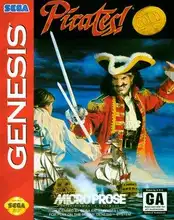The vast, unforgiving ocean has always held a certain allure, a stage for grand strategy, tense stealth, and explosive action. For gamers, this translates into a deep and engaging genre: naval games. While modern simulators boast incredible graphics, there's a unique charm and strategic depth to the classic naval titles that ruled the waves on our old PCs.
If you fondly remember the days of floppy disks, chunky pixels, and gameplay that demanded patience and intellect, then the world of retro naval gaming is calling you back to port. Let's weigh anchor and explore some of the timeless experiences waiting to be rediscovered.
What Made Retro Naval Games Special?
Before photorealistic waves and complex physics engines, classic naval games relied on clever design, strategic depth, and the power of imagination. They often fell into a few key categories:
- Submarine Simulators: These games focused on stealth, patience, and the terrifying thrill of the hunt from beneath the waves. Sound was often your most crucial tool.
- Surface Fleet Strategy: Commanding fleets, managing resources, and executing grand battle plans across vast maps were the hallmarks here. Think strategic movement and decisive engagements.
- Action/Simulation Hybrids: Putting you directly on the bridge of a single ship, mixing tactical movement with direct control during combat.
- Ship Design & Management: Some niche titles even let you get deep into the technical details of building and maintaining your vessels before sending them into battle.
These games often demanded a steeper learning curve than today's titles, but mastering them felt incredibly rewarding. They weren't just about clicking buttons; they were about understanding tactics, history, and the sheer power (and vulnerability) of naval vessels.
Classic Vessels Worth Boarding
Looking back, several titles stand out as pillars of the retro naval genre. While not an exhaustive list, these offer a taste of the high seas from yesteryear.
Silent Service (1985)
MicroProse practically defined the submarine simulator genre with this gem. Putting you in the shoes of a US submarine captain in the Pacific theater of WWII, Silent Service was revolutionary for its time. It blended strategic map movement with nail-biting first-person torpedo attacks. Avoiding Japanese destroyers using only hydrophones was incredibly tense. It spawned sequels, but the original has that undeniable vintage charm.
Destroyer Command (2002)
Though slightly later, Destroyer Command offered a detailed simulation of commanding a US destroyer or destroyer escort during WWII. Paired with the simultaneous release of Silent Hunter II (which it could link up with for multiplayer battles!), it provided a different perspective – the hunted rather than the hunter. Managing multiple stations and crew members while dodging torpedoes was a thrilling challenge.
Harpoon (Series, starting 1989)
Based on the popular naval wargame, the Harpoon series is pure, unadulterated fleet strategy. Focusing on modern (or near-future) naval combat, these games were database-heavy and complex. You commanded entire battlegroups, managing sensors, weapons, and logistics across vast operational areas. It's not for the faint of heart, but for serious armchair admirals, it offered unparalleled strategic depth.
Red Storm Rising (1988)
Another MicroProse classic based on Tom Clancy's novel. This game put you in command of a modern nuclear attack submarine during a hypothetical conflict in the North Atlantic. Blending strategic movement across a campaign map with detailed tactical submarine simulation, it captured the tension of Cold War underwater cat and mouse perfectly.
Great Naval Battles (Series, starting 1992)
This series from SSI focused on historical surface engagements, primarily from WWII. Great Naval Battles allowed players to recreate famous clashes or explore hypothetical scenarios, managing individual ships or entire task forces. It was known for its detailed ship data and realistic ballistics modeling, offering a strategic look at fleet combat.
Finding These Old Salts Today
Worried these classics are lost to time? Thankfully, the retro gaming community and digital distribution have made many of them accessible again.
- GOG.com (Good Old Games): This platform is a treasure trove for classic PC titles, often pre-configured to run on modern systems. Many MicroProse and SSI titles can be found here.
- DOSBox: For games from the DOS era (like the original Silent Service or Red Storm Rising), the DOSBox emulator is your best friend. It allows you to run these old programs seamlessly on Windows, macOS, or Linux.
- Archive.org: The Internet Archive has a vast collection of historical software, including many playable-in-browser DOS games. While legality can vary depending on the title's abandonware status, it's a fantastic resource for preservation and discovery.
Setting up DOSBox or navigating GOG is part of the fun for many retro enthusiasts. It's a small hurdle to overcome to experience these pieces of gaming history.
Why Revisit the Old Fleet?
Apart from the nostalgia trip, these retro naval games offer experiences you don't always find in modern titles. Their focus on strategic thinking, simulation fidelity (within the technical limits of the time), and often complex interfaces can be incredibly rewarding. They teach patience, planning, and sometimes a bit of digital seamanship.
So, if you're ready to trade hyper-realistic waves for strategic maps and pixelated periscopes, there's a whole ocean of classic naval games waiting for you. Man the bridge, plot your course, and dive into the past!
FAQ: Getting Started with Retro Naval Games
Q: Are these old naval games hard to learn? A: Some can be, especially complex simulations like Harpoon or Great Naval Battles. They often require reading the manual (or a digital version!) to understand the interface and mechanics. However, simpler ones like Silent Service are more accessible.
Q: Where can I legally buy or download these games? A: GOG.com is the primary source for legally purchasing many classic titles, often enhanced for modern systems. For abandonware or historical preservation, Archive.org is a resource, but always check the legal status in your region.
Q: Do I need special software to play them? A: Games from GOG usually come ready to play. For older DOS games not on GOG, you'll likely need an emulator like DOSBox to run them on a modern operating system.
Q: Are there any retro naval arcade games? A: Yes! While this post focused on PC simulations/strategy, arcade classics like Sea Wolf or Battlezone (the tank game, but often involved naval combat themes) touched on naval combat themes, offering quicker, action-packed experiences.

